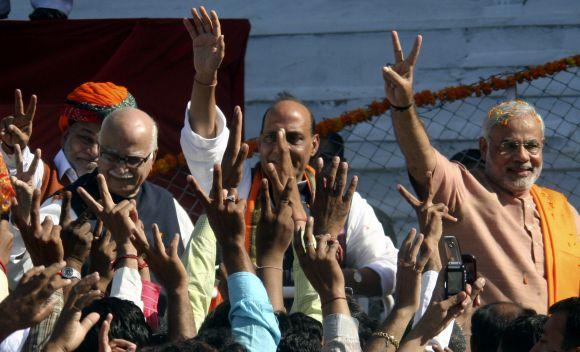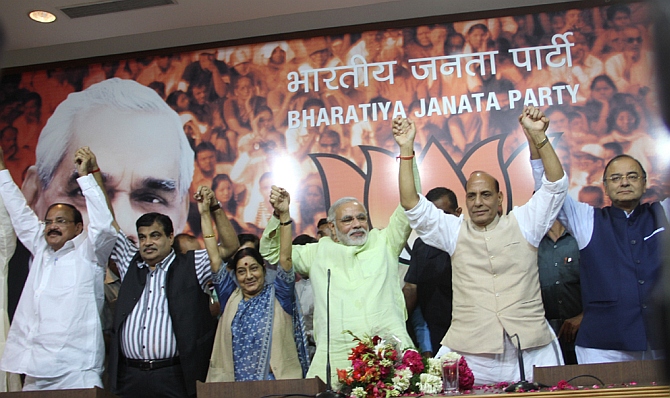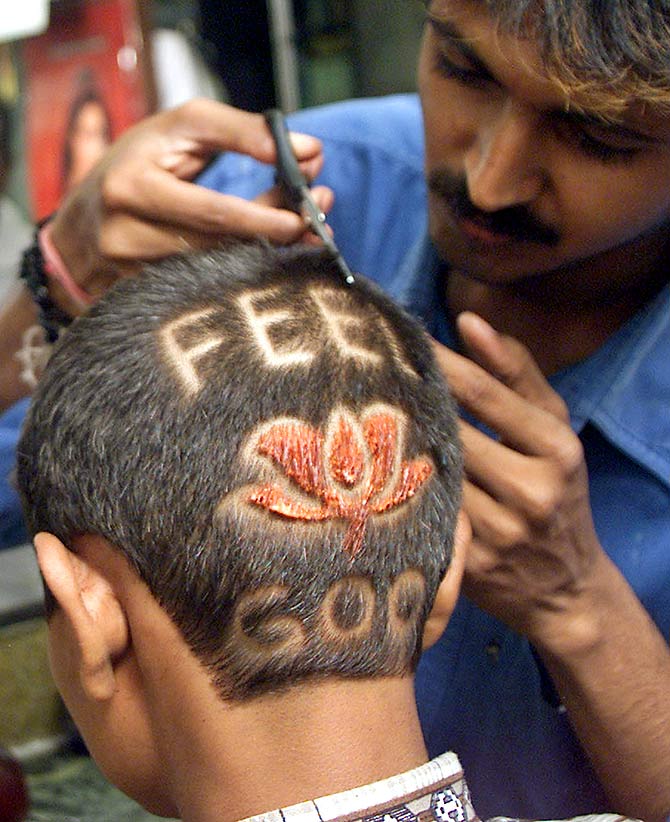
'It is the first time since Independence that there is a leader who claims to be completely self-made.... Although he is in the BJP, frankly, it is now Modi who is defining the BJP's persona than the BJP defining him as it were.'
Pratap Bhanu Mehta, arguably India's finest political thinker, speaks to Rediff.com's Sheela Bhatt in an eloquent interview.
There is no one quite like Pratap Bhanu Mehta. He is young but pragmatic, wise but not predictable. He is an analyst who speaks boldly, but is not necessarily provocative. When he speaks, the political class listens.
His voice is unbiased and sharp. For the last couple of years he has severely criticised the United Progressive Alliance government, the Congress dynasty and the government's policy paralysis.
In an illuminating interview with Rediff.com's Sheela Bhatt, Mehta, the president, Centre of Policy Research, a New Delhi think-tank, discusses politics, Rahul Gandhi and Narendra Modi.
 The Congress and the Bharatiya Janata Party have not officially announced their campaign for the general election because we are waiting for five-state election results on December 8. Do you feel that this Lok Sabha election will revolve around the issue of communalism? What is your take on the 2014 election?
The Congress and the Bharatiya Janata Party have not officially announced their campaign for the general election because we are waiting for five-state election results on December 8. Do you feel that this Lok Sabha election will revolve around the issue of communalism? What is your take on the 2014 election?
Clearly, it is a very important election and at many different levels the election is going to be a new benchmark for Indian politics.
First, of course, is the way issues and parties are being defined. For the first time actually, in living memory, you have a national election that may turn out to be more of a presidential form of a campaign.
An election where a new insurgent leader (Gujarat Chief Minister Narendra Modi) is trying to create national legitimacy around his persona, single-handedly.
Whether he succeeds or not is an open question, but that attempt itself makes this in a sense a very different election.
I think there is also the second level at which this election is really interesting. For the last 20 years there was this sense where you had the Congress and the BJP as two poles of electoral politics but by and large regional parties have done very well.
There is always been incipient talk of coalition politics dominating. The interesting question is whether in this election there will be a reversal to two poles of either the Congress or the BJP, or will you see more fragmentation of the political system?
My hunch is that we are beginning to get some evidence that you will actually get a reversal to the two main poles of Indian politics.
Think of it in analogy with the Uttar Pradesh elections of 2010, where two things happened. One: People wanted to take a decision. Are we dissatisfied with the incumbent government and who do we vote for? What we have been seeing in recent elections is a consolidation towards one party.
So if you went by strictly political arithmetic, the Samajwadi Party should not have done as well in UP as it did. But once it became clear that people wanted a different government, then, they asked the question who is most likely to be able to form a stable government and that probably added a little bit of momentum to the SP.
So in that sense, the voting calculus goes beyond simply the arithmetic of your caste, it goes simply beyond your social milieu.
It actually takes seriously this question of who might be able to provide a stable government. And that might then give the BJP or the Congress a little bit more consolidation than they might otherwise not have had.
Kindly ...

Do you expect a violent election campaign?
There is no reason to. Given our history there are always these possibilities of unforeseen incidents. Terrorist incidents like the 26/11 attacks in Mumbai. Who had foreseen that?
But there is no reason in particular to imagine or to believe that this election is going to be any way more violent than any of our recent elections. Your question is loaded in two ways.
One is about election-related violence. That there is something about the process of elections itself which generates violence. I think the Indian system is pretty mature and confident enough. We have now conducted enough elections. All parties have shown commitment to the electoral process. Nobody is going to subvert it through violence.
The other possibility which people point out is in the run-up to the elections, you may actually get forms of politics that generate violence.
People are pointing to the kind of violence in UP -- the violence in Muzaffarnagar where you might argue that different parties have a stake in producing political violence and producing polarisation through violence.
That is certainly a possibility and certainly after what happened in UP and what has been happening in UP on the ground.
UP is a very critical battleground state. I don't think one should underestimate the possibility of political violence.
But you know the truth of the matter is the one thing we do know about political violence in India is that if the state government machinery is committed to preventing it, it usually can.
I would imagine now, right now, even in this charged political atmosphere that most state governments -- no matter which party they belong to -- actually have a real incentive not to let this violence get out of hand.
It will reflect on their governance records, in a sense, very badly.
It is not even clear actually for most political parties that if they were to be polarisation through violence what its electoral consequences are going to be.
I think we often pretend that we think that there is a logic to political violence which can lead us to predict that it will benefit one party or another. It could be that it benefits a party locally, but it actually damages it nationally.
So my sense is that I think there are local tensions which political parties will play on, but by and large they have an incentive to keep this violence down.
I can put this question in many ways, but I am putting it very simply: How can we understand the Modi phenomenon?
I think the Modi phenomenon, at its basic, has two elements. The first element is that it is not so much a Modi phenomenon as much as it is a kind of emerging anti-Congress phenomenon.
And the diagnosis lots of people are making of India's current predicament is that there is a lack of leadership. That by and large you have a prime minister who doesn't take responsibility, you have Rahul Gandhi who is -- let us put it this way -- who is four-days-a-week into leadership.
He is very episodic, if he leads at all. And most voters want an assurance that there is somebody in charge and in good faith. Right now they are not getting their assurance from the Congress party.
So a lot of surge for Modi is in a sense is -- here is somebody, you can agree or disagree with him, but who is ready to come and take charge. He is kind of saying -- Look, I'll be responsible for x,y,z, whatever.
So I think it is that leadership vacuum which is creating the conditions for somebody who projects himself as a strong leader to be a more plausible and attractive candidate then he might have otherwise been.
Second, you know at one level Modi's faults are very apparent to everybody. The 2002 Gujarat riots are still an issue. We can't pretend that it is not an issue. And how he politically deals with it is important.
I think for many people his personality is an issue. I think because we focused so obviously on his faults, I think we sometimes miss the appeal that he has -- particularly amongst younger people.
I would characterise the appeal this way, which is, again you don't have to endorse it, but, it is literally the first time since Independence, with one or two minor exceptions, that there is a leader who claims to be completely self-made.
In terms of his social origins and making it to the highest levels of politics. Who is trying also to transcend his own state.
You actually can't think of very many figures who have tried this since Independence. Most of our big leaders have remained confined to particular social constituencies since Independence. They rose in a particular caste or particular region.
And so, this combination is intriguing to a lot of people. That it is possible to self create this legitimacy and it is self created.
Although he is in the BJP, frankly, it is now Modi who is defining the BJP's persona than the BJP defining him as it were. So I think that possibility is intriguing.
Whether people will be convinced by it in the end is still an open question. But you have the sense of there is something genuinely new happening in Indian politics which hasn't happened for a long time.
The third and final thing that I was going to say is that it is an interesting movement where India is rapidly changed so there are more urban voters and constituencies that will matter a lot.
There is an emerging middle class.
There is a whole new technology of campaigning. And I think one of the interesting things about this campaign is in a way the deployment of what you might call the techniques of propaganda.
You know what it means to actually communicate a message in the kind of complex and changing social and technological environment we have. And how will the political class come to terms with it? Some people think Modi has an advantage there.
Kindly ...

Some people think that now Modi is established in the BJP the issue of the 2002 riots will come to the forefront. Do you think this election will decide essentially the idea of secularism?
Will a vote for Modi or against Modi decide how the new generation of India is thinking?
See, I would be a little bit cautious about that. I think to me, the secularism debate has to move to a slightly different plane, on a different set of issues. I think the debate over secularism now has two aspects.
I maintain that politics is not often so much about ideas. It is about credibility.
Do you trust certain kinds of people to do things in good faith? They may make mistakes.
Jawaharlal Nehru could get away with a lot of mistakes, but by and large there was a sense of credibility about him.
At some point with Rajiv Gandhi it wasn't whether Rajiv was secular or not, that also people began to question and argue that he was pseudo-secular. At some point, he lost credibility.
Now how do leaders come to acquire credibility?
Ideology is one element of that. I mean obviously if you say completely nasty things and stupid things and things people can't believe, you will lose credibility at some point.
But I think it is important to remember that credibility is only one element or ideology and beliefs are only one element of projecting your credibility.
To me, fundamentally right now, this election is less about ideas. I mean, I don't think there are that many radically new ideas being discussed or projected. I think it is about creating a new narrative of credibility where Modi wants to say look at my governance record, I am actually a credible leader, I am credible in the sense that I take decisions, credible in the sense that by and large I deliver what I promise.
But in terms of the ideas I actually still don't see any radically new ideas. In economic policy, for example, right now at least what we are able to see, actually that the distance between the Congress and the BJP is not that great.
And partly it is also because political parties take their positions opportunistically depending on whether they are in opposition or not. But right now, I don't see this election as having thrown up a kind of deep contest of ideas.
Very interesting. You just said the 2002 riots have not been forgotten, but when I go to people, not many people are talking about the 2002 riots. They should be, but they are not talking about it. So I thought people's idea of secularism is changing.
It is not that people's idea of secularism is changing. It is that both choices you have -- for most people, we confine ourselves to the Congress and the BJP for the time being -- are flawed.
The Congress at the moment is coming with a baggage of an absence of leadership, a recent history of corruption and nepotism which has eroded its legitimacy, and a sense of a party adrift.
The BJP is also coming with baggage, 2002 is certainly a part of that baggage, but it is trying to compensate for that baggage by other things it is claiming to have done like good governance in the states which it runs.
Now when the choice is between two very flawed parties, you can't easily map ideological virtues and vices to each uniquely.
Let us take the secularism and communalism issue, and I would look at it in institutional terms. It is not that there are ideological differences, but fundamentally the Congress government failed in Assam to prevent communal riots and there are thousands of Muslim refugees there.
It is not clear that either the BJP or the Congress has any track record on the kinds of police reforms, investigation reforms, judicial reforms, that would allow you to actually bring justice to victims of riots.
So at that operational level, the differences between the two parties aren't that stark. And so people put it aside because there is no easy answer to that question.
If people could stand up and say you know what I think riot victims would get justice if the Congress came to power, it is one thing. You could easily vote for it, right? But you don't have confidence in that answer.
So I don't think people's conception of secularism has changed; it is just that given the faulty choices, you want to put this issue aside and then hope something else comes up.
Part 2 of the interview: 'If Modi wins 185 plus seats, it will change the rules of Indian politics'